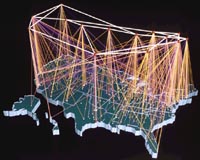 |
San Francisco (AFP) Aug 28, 2009 Music and Internet worlds merged Friday on San Francisco's posh Nob Hill as insiders brainstormed about industry rocking Web 2.0 trends from social networking to smart phones with cameras. Internet technologies will transform a music industry in which recording studio revenues have tumbled along with CD sales, according to those gathered for an elite Bandwidth Conference. "The technology is really there to empower the consumer and the artist," said Gracenote vice president of product and content management Stephen White. "It is about creating better experiences around music, and we think the same is true for movies, TV, and other entertainment content." Gracenote specializes in music recognition technology and is used in Apple's iTunes online shop. Sony bought the California company last year for a reported 260 million dollars. CarStars unveiled by Gracenote this year lets drivers pick beloved musicians to be "musical guides" that orchestrate playlists based on what they think best fits a moment, whether it be touring a coast or commuting. "We see in the future a much better experience; holistic offerings," White said. Fans will be able to interact with artists in more rewarding ways, White predicted. Creative Allies plans to soon launch a test version of software that lets artists hire fans to create anything from concert posters and t-shirt designs to music videos and biographies, according to the startup. The amount of money raked in from live concerts has rocketed, triggering an array of commission-based online services for hunting down tickets, according to JamBase chief executive David Rosenheim. The JamBase mission is to be the ultimate online resource for live music fans. The availability of recorded music online pressures musicians to deliver live shows that go far beyond playing songs from their CDs. "Definitely, you have to put on a show," said Diaris Alexander of Youth Movement Records, a group that works to cultivate music business savvy in young members of the Hip Hop generation. "We look for interactive media...we need a greater experience otherwise why not just listen to their music online?" Live shows drive sales of recorded music in the Internet Age and provide opportunities to cash in by selling fans videos of performances on flash drives or DVDs as they leave venues. It appears that amateur video shared online at websites such as YouTube inspires fans to seek professional versions where money can be made. "YouTube videos are the gateway drug," said a professional music videographer at Bandwidth. "I think most bands do embrace the bootleg model as a way to get people to the pro sites." Artists can also cash in on data bases of contact information about fans, firing off emails or text messages to alert them to new songs, band merchandise, or show dates. Online communities such as MySpace and Facebook are influential venues for musicians, since suggestions from friends factor into almost all purchase decisions, according to Rosenheim. New age jukebox approaches that stream music online as paid or ad-supported services seem to be gaining traction. Online radio service Pandora is showing lasting power and music streaming service Spotify offers an iPhone application considered a challenge to Apple's online iTunes shop. "There are tons of new models around recorded music; most haven't worked," Rosenheim said. "People are consuming more music than ever before. Unfortunately for the labels, they are not paying for it." Share This Article With Planet Earth
Related Links Satellite-based Internet technologies
 US ranks 28th in Internet connection speed: report
US ranks 28th in Internet connection speed: reportWashington (AFP) Aug 25, 2009 The United States ranks 28th in the world in average Internet connection speed and is not making significant progress in building a faster network, according to a report released on Tuesday. The report by the Communications Workers of America (CWA) said the average download speed in South Korea is 20.4 megabits per second (mbps) -- four times faster than the US average of 5.1 mbps. Japan ... read more |
|
| The content herein, unless otherwise known to be public domain, are Copyright 1995-2009 - SpaceDaily. AFP and UPI Wire Stories are copyright Agence France-Presse and United Press International. ESA Portal Reports are copyright European Space Agency. All NASA sourced material is public domain. Additional copyrights may apply in whole or part to other bona fide parties. Advertising does not imply endorsement,agreement or approval of any opinions, statements or information provided by SpaceDaily on any Web page published or hosted by SpaceDaily. Privacy Statement |